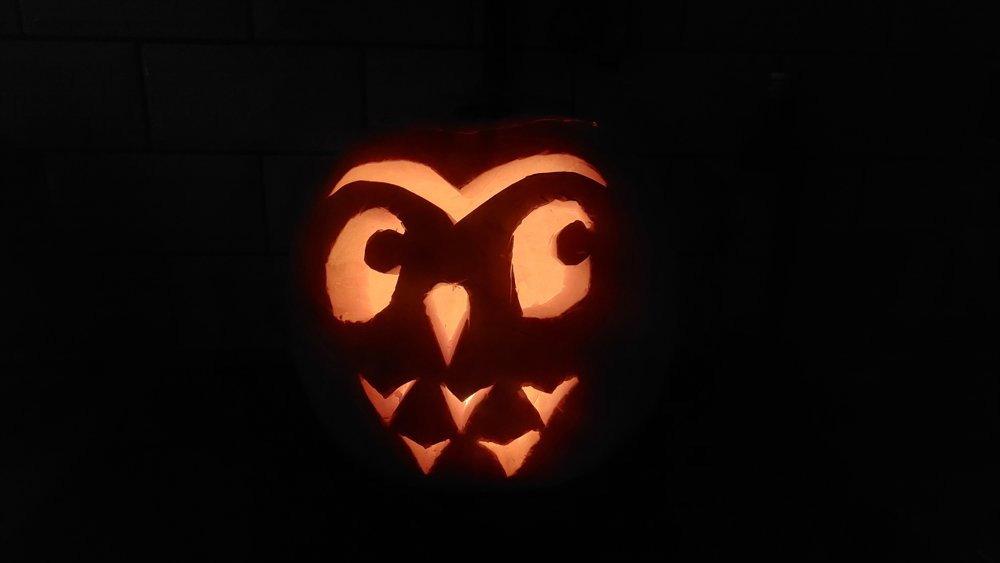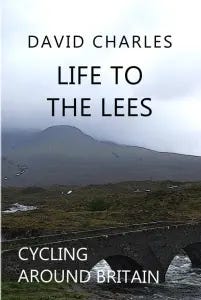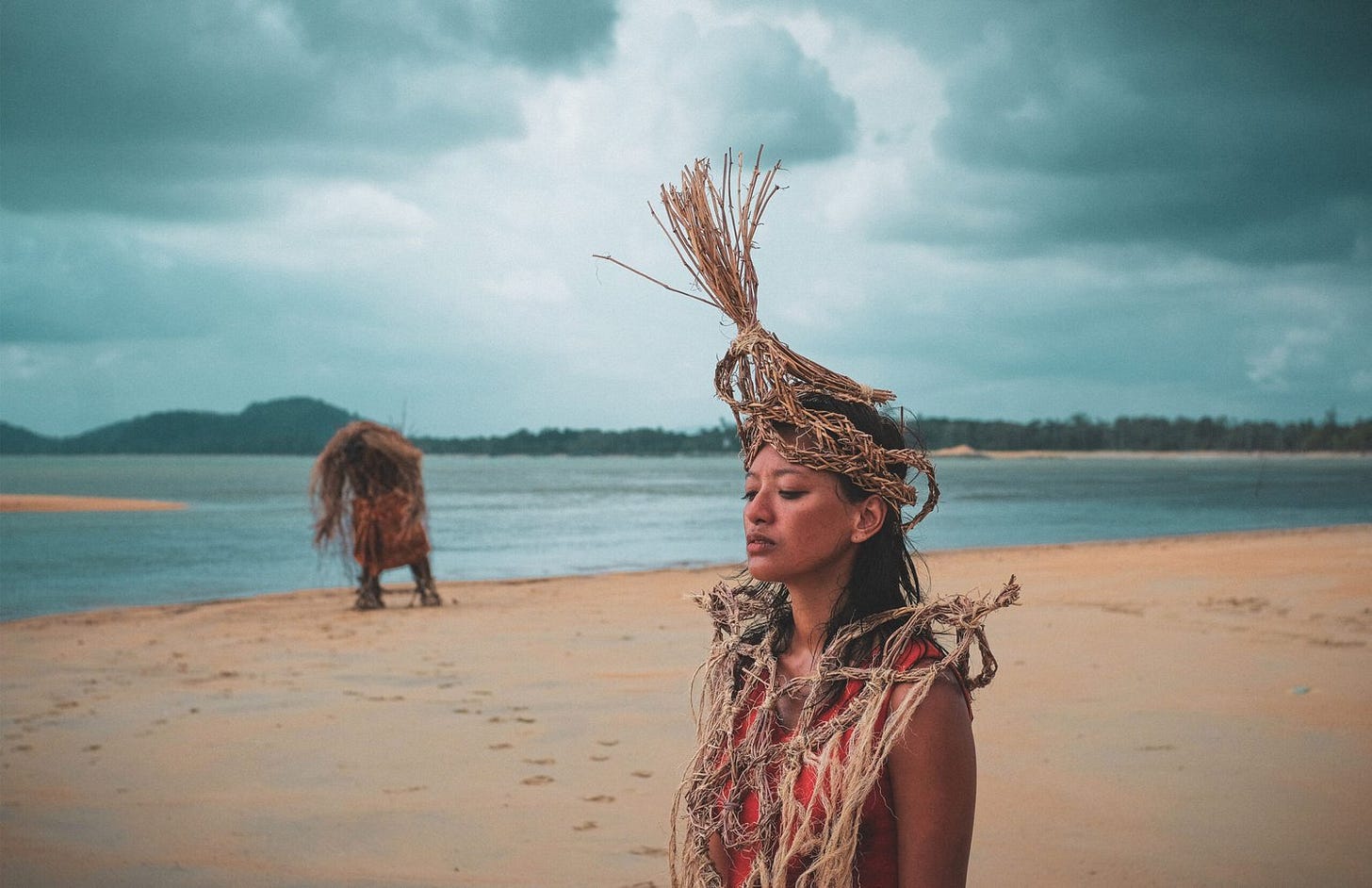Do It While You Can
How would you like to feel, in your mind, in your body, at the moment of death?
Happy Autumn!
And a fireside welcome from the weekend!
For those of you new around these parts, welcome 👋 My name is David and I’m a writer, outdoor instructor, cyclist-at-large with Thighs of Steel and Expeditions Manager at British Exploring Society.
I know that we’ve only had the concept of the ‘weekend’ for less than two centuries and I know that Han Dynasty China had one day off every five days for ‘washing one’s hair’ and I know that Romans only had one day off every nine days and I know that the French Revolutionary Calendar only allowed one day off every ten days, so I know that two-day weekends are great, but I can’t help wondering whether three-day weekends would be even better. (And could cut carbon emissions by 30 percent.)
In this newsletter, I write stories that help you and me understand the world (and ourselves) a little better.
Sometimes I love weekends too much.
Do It While You Can
How would you like to feel, in your mind, in your body, at the moment of death?
This week, as advised by Geshe Tenzin Namdak, I’ve been using the dark minutes before sleep as a rehearsal.
Sleep as death; dream state as transcendence; waking as rebirth. I’ve found it puts any pettyfogging worries to rest and quiets the mind. Sleep comes more easily to those who surrender.
It’s also brought me closer to memories of my nan: the only person whose deathbed I’ve sat beside. Memories of life and how to live.
This week’s story is an extract from Life to the Lees, a book I wrote about cycling around Britain in the weeks following my nan’s death. Enjoy.
~
It’s St George’s Day.
Tomorrow is nan’s ninety-sixth birthday, so I buy her a present: a small potted plant with little yellow flowers. She likes plants and their flowers; her Epping rose bushes came a close second in her affections to her children and her grandchildren.
The nursing home is the kind of red brick country house that wouldn’t look out of place on the set of an ITV murder mystery, with a long gravel drive that crunches under your wheels.
I ring the doorbell, which is opened by a nurse in a blue smock. I sign the visitor's book and breathe in the smell of carpets and disinfectant, optimistically masked by a bouquet of synthetic sprayed aromas. I walk straight down the hallway, through the sitting room, past the fish tank and the kitchen, to nan’s room. The door’s wide open.
‘Hello nan!’
She looks up, eyes searching for something she might recognise. ‘Who’s this?’ Her lips chew over each other, suspiciously.
I take a couple of steps into the room. ‘It’s David, your grandson.’
Then her eyes catch up and her face lights up. She takes my hand in hers, as I sit down on the stool by her side. Her palms are soft, with waves of wrinkles rolling over the gentle knuckles. So soft, worn down, eroded by the years, by countless caresses and gentle gestures.
‘I brought you a present,’ I say and give her the plant. She takes it onto her woollen skirt and inspects it closely. She’s been wearing those skirts for as long as I’ve known her and that’s almost thirty years. She probably made them herself.
‘That's lovely. Thank you.’ She looks confused still, as if wondering why anyone would be bringing her a present, but is too polite to ask.
‘It's your birthday tomorrow, isn't it?’ I say.
She looks up at me, mildly shocked. ‘Is it?’
‘Yep. Today’s St George's Day.’
‘Is it now.’ Her eyes wander off into the middle distance. Surely she remembers who St George is?
‘Yep. I couldn't find a dragon, though.’
The eyes snap back and she smiles. ‘Well, I never did,’ she says. ‘Doesn't time fly?’ She struggles forward to tickle the ears of an enormous soft toy sheepdog that lies at her feet. ‘Good boy! Who's a good boy?’
‘Memory's a strange thing, isn't it?’
She leans back up from the dog. ‘I have so many that it's hard to know what is real and what is memory sometimes.’
‘What's the earliest thing you remember?’ Whenever I go to see nan, I always want to hear something new from the vaults of her memory, from the silo of almost a hundred years.
When you’re young, you believe that every day will bring new life and new memories, but I don’t think nan’s made a single new memory for months, if not years. She’s full up.
‘Gosh. The first thing I remember is my father... I think it was my father, he was... He was...’ She frowns. ‘I can't remember now. Maybe he was getting ready for the next day?’ She turns to me, as if I’ve got the answers. ‘I think it was a Sunday and he was getting ready for work on Monday.’ She smiles, momentarily defeated. ‘He was doing something, anyway.’
‘Anything else you remember?’
She’s looking straight ahead now. She points a weak finger at a print on the wall opposite. ‘You see that picture?’
It’s a scene of a road curling through a wood. It used to hang on the wall of her living room in Epping and sparks strange familiar memories of childhood in me; the strange memories that accompany otherwise meaningless objects.
‘I remember the day I bought that.’
‘Oh yes?’
‘We'd been to that exact spot, to have a picnic. I must have been in my early twenties, I should have thought. It was before the war, anyway. With my girlfriends, we cycled there together.’
‘Nice.’
‘It was a lovely day. A very happy day. We had a lot of fun in those days.’ She checks with me; I smile. ‘Then, on our way home, in the town, I saw that picture in the window of a shop and I had to buy it.’
‘Of course!’
‘It's been with me ever since.’
She’s told me this story five or six times in the last few weeks. It’s totally improbable, of course, totally fabricated from the torn shreds of her memory, but it’s a beautiful fabric. One of the blue-smock nurses bustles into the room.
‘Morning Win,’ she says, in her loud-and-clear voice for elderly people. ‘Have you drunk your tea?’ She doesn't wait for an answer and peers into the cup. It’s full. And cold. ‘Oh Win.’ The nurse smiles at me. ‘She’s always asking for tea and then you forget about it, don't you, Win?’
Nan’s eyebrows wrinkle together. ‘What’s that?’
‘You’ve forgotten your tea, haven’t you, Win?’
‘Have I?’ She reaches a hand for the cup, but the nurse whisks it away onto her tray.
‘I’ll get you a fresh cup, shall I?’ The nurse smiles vigorously again. ‘I’ll leave you in peace with your grandson now, Win.’ And she whirls out of the room.
Nan leans over to me. ‘I don't know what that was about,’ she says, conspiratorially.
I’m not expecting what happens next. I thought I was just making small talk, but nan has other ideas.
She squeezes my hands between hers and makes sure that her eyes are looking directly into mine and then she says, ‘Do it while you can. You’re still young; do it while you can.’
I walk out of the nursing home into the dazing sunshine. My eyes hear the words again: Do it while you can.
Nan sits alone in her armchair all day, getting tea, forgetting tea, unable to remember her own birthday. But still she says: Do it while you can. Make the memories, she says, even if in time they are lost.
It’s a potent message of optimism and it’s the last time I speak to the human being she was.
~
p.s.: ‘Life to the lees’ is a quotation from Ulysses by Alfred Tennyson:
… I cannot rest from travel: I will drink
Life to the lees: All times I have enjoy’d
Greatly, have suffer'd greatly, both with those
That loved me, and alone, on shore…
p.p.s.: If you’d like to read more about my nan (and/or cycling around Britain), you can buy Life to the Lees for less than a tenner.
Three Tiny Big Things
1. G.O.D.S. (Gratitude, Offering, Death, Simplicity)
Following my missive on death meditations, thanks to Dan at
for sharing this sung prayer. Beautiful.2. Have You Heard Of COF-999?
A typical large tree can suck as much as 40 kilograms of carbon dioxide out of the air over the course of a year. Now scientists at UC Berkeley say they can do the same job with less than half a pound of a fluffy yellow powder.
Imagine discovering this as part of your PhD research? Take a bow, Zihui Zhou.
Incidentally, the study’s senior author, Professor of Chemistry at the University of California, Berkeley, is a man called Omar Yaghi, who arrived in the US aged 15 with little English, the son of Palestinian refugees.
As the good people at Fix The News like to say, ‘The real immigration crisis? Not enough immigrants.’
Talking of which…
3. The London Migration Film Festival is back
20-27 November. Programme here.
Thank You
Huge thanks to all the paying subscribers who helped make this story possible. You know who you are. Thank you. 💚
If you enjoyed this one, then go ahead and tell me. It’s the only way I’ll know. You can tap the heart button, write a comment, share the newsletter with friends, or simply reply to this email.
If you’re not into the whole Substack subscription thing, then you can also make a one-off, choose-your-own-contribution via PayPal. That’d make my day.
As always, thank you for your eyeballs and thanks for your support.
diwyc,
dc:





